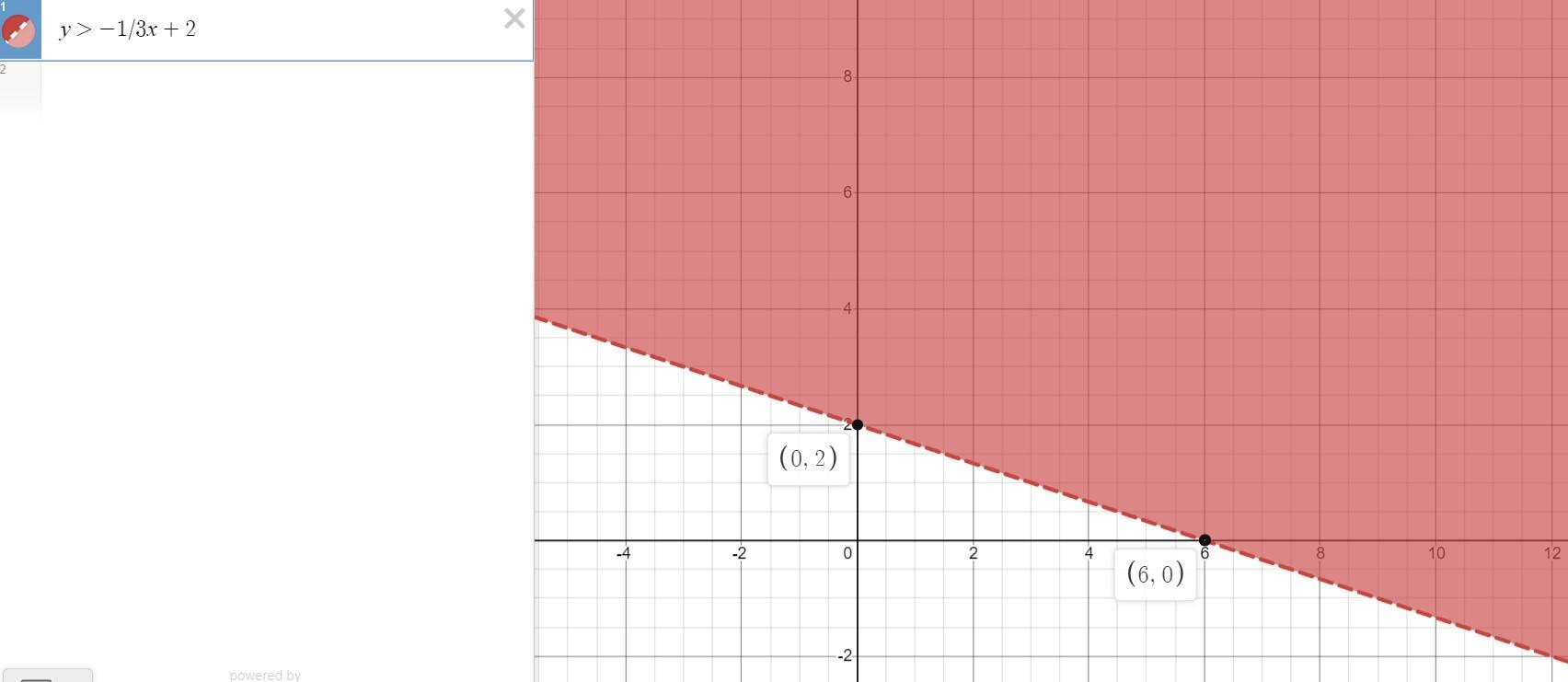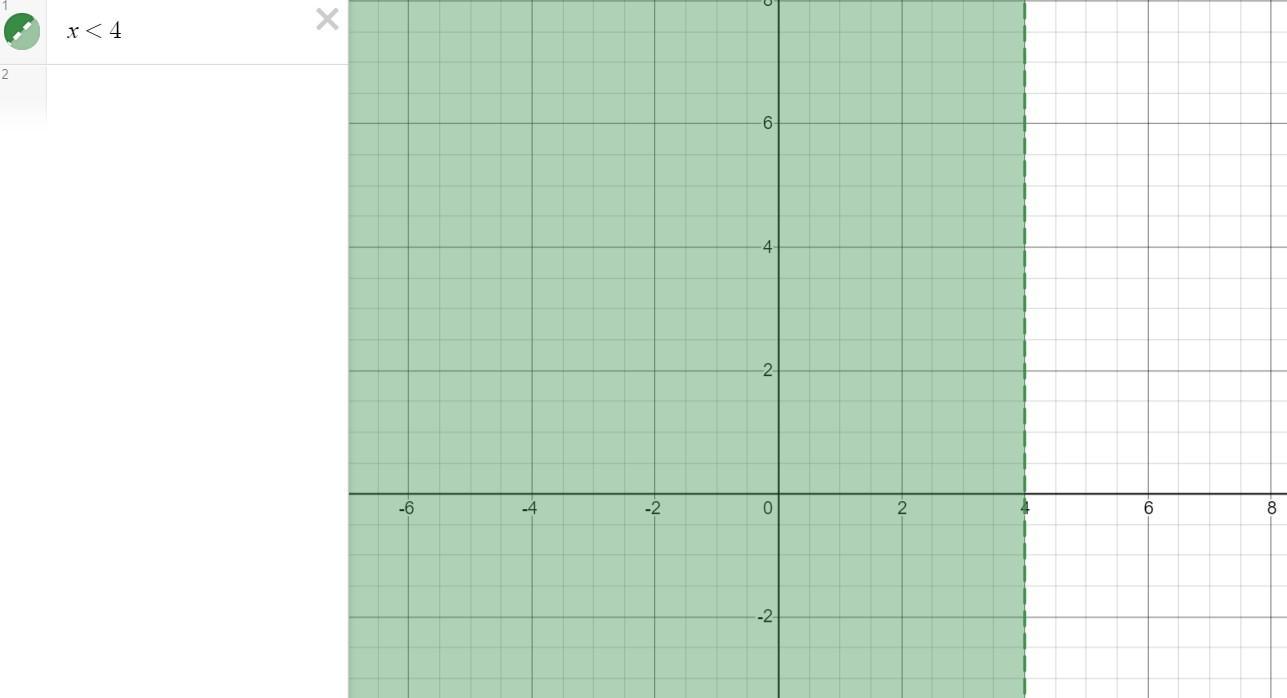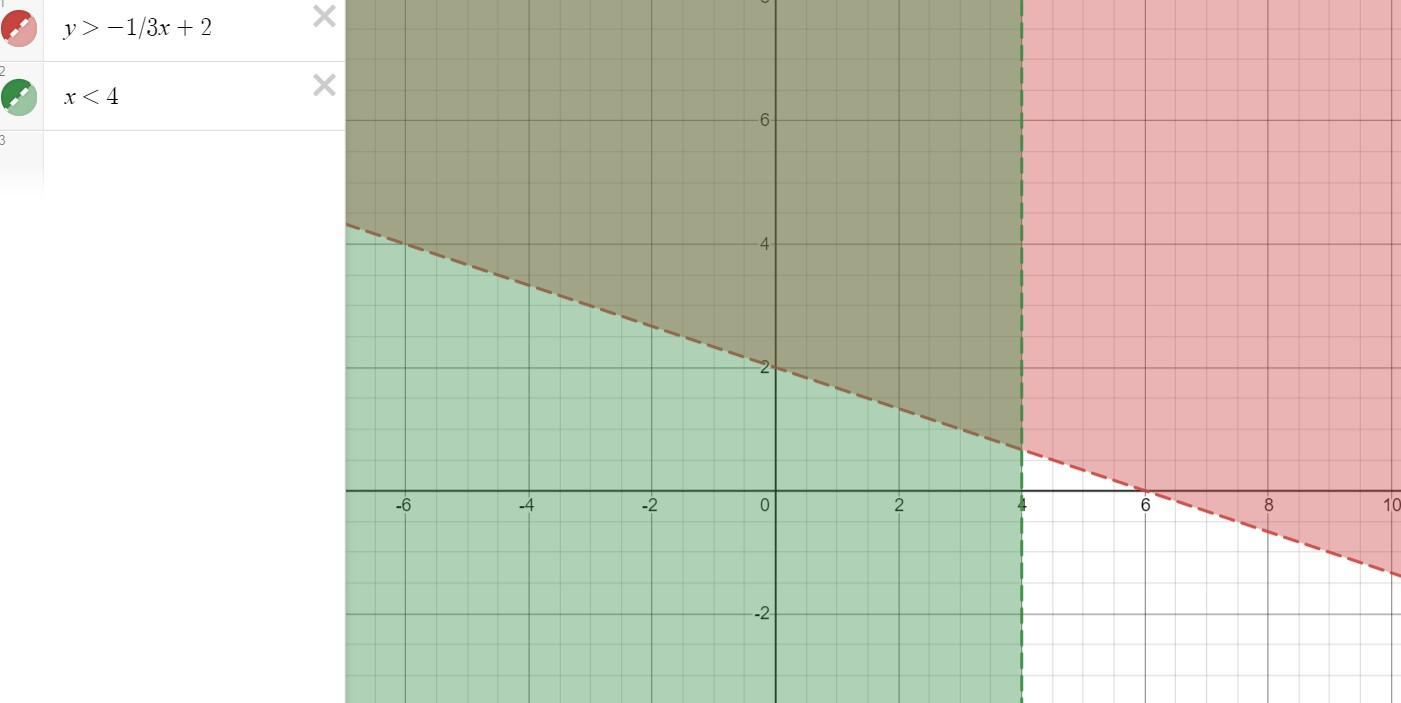y>-1/3x+2 x<4 how to solve the system of inequalities by graphing.
Answers
Answer:
See belowStep-by-step explanation:
1. Graph each inequality2. Take the intersection of shaded regions as solutionAttached each inequality separately and the solution showing the intersection below.
y > -1/3x + 2
Find the x - and y - intercepts, connect them with dotted line, shade the area above the linex < 4
Draw a dotted line x = 4, shade the area to the left of the line


Related Questions
Find The slope of the line represented by the points in the table (use your notes to get the formula it needed).
4.
Number
of Hours
1
2.
3
4
Cost
($)
$17
$29
$41
$53
Answers
Please verify how [tex]\frac{1-cos(x)}{sin(x)} =\frac{sin(x)}{1+cos(x)}[/tex]
Answers
Answer/Step-by-step explanation:
[tex]\frac{1-\cos \left(x\right)}{\sin \left(x\right)}=\frac{\sin \left(x\right)}{1+\cos \left(x\right)}[/tex]
When you have an equation like this, you can start from either side. So, let us start from the left side.
[tex]\underline{\mathrm{Left\:side:}} \quad\frac{1-\cos \left(x\right)}{\sin \left(x\right)}[/tex]
[tex]\sf{Rewrite\: using \:Trig \:identities=\frac{\sin \left(x\right)}{1+\cos \left(x\right)}}\\\\\mathrm{Therefore,\: it \:is \:true}[/tex]
What is the value of v?
Answers
By isosceles triangle theorem,
Angle ZXY = Angle ZYX
The sum of the angles in a triangle is 180 degrees.
106 + 2 same angles (-106) = 180 (-106) (Subtract 106 by both sides)
2 same angles (/ 2) = 74 (/ 2) (Divide 2 by both sides)
V = 37
Answer:
The value of v is 37°.
Step-by-step explanation:
Given that △ XYZ is an isosceles triangle where both sides have the equal angles. The total angle of △ is 180°. Let ∠ZXY and ∠ZYX be the same angles:
Let ∠ZXY = v, ∠ZYX = v, ∠ XZY = 106°,
∠ZXY + ∠ZYX + ∠XZY = 180°
v + v + 106° = 180°
2v + 106° = 180°
2v = 180° - 106°
2v = 74°
v = 74 ÷ 2
v = 37°
Evaluate. (2a−1/3)÷b/15 when a=−4/5 and b=−2.25 Enter your answer as a simplified mixed number in the box.
Answers
A new cell phone costs $108.99 in the store. What would your total cost be if the sales tax is 4.5%? Round your answer to the nearest cent, if necessary.
Answers
Answer: $113.89
Step-by-step explanation:
108.99 * 0.045
= 4.90455
108.99 + 4.90455
= 113.89455
$113.89
Answer:
Total Cost = $113.89
Step-by-step explanation:
Total Cost = Cell phone cost + sale Tax % ( cell phone cost)
Total Cost = $108. 99 + .045 × $108.99
Total Cost = $108.99 + $4.90455
Total Cost = $108.99 + $4.90
Total Cost = $113.89
Find the solution set of the inequality
14−3x<−1.
If right will mark Brainlyest!
Answers
Answer:
x > 5
Step-by-step explanation:
14 -14 - 3 x < -1 -14
-3 x < -15
-3 x / -3 < -15 / -3
x > 5
Bạn dự định đi học thêm vào mùa hè này. Nếu đi học bạn sẽ không thể đi làm với thu nhập là 5 triệu đồng và không thể ở nhà nghỉ ngơi. Học phí là 2 triệu, tiền mua giáo trình 300 ngàn, sinh hoạt phí là 1.5 triệu. Hãy xác định chi phí cơ hội của việc đi học thêm vào mùa hè này.
Answers
Answer:
4 better inbox
Step-by-step explanation:
answer this question fast
Answers
Answer:
0.09
Step-by-step explanation:
Graph the line with slope 7 and y-intercept -7
Answers
Given :-
To graph the line with slope 7 and y intercept -7.To Find :-
The graph of the line .Solution :-
Here since the slope of the line is 7 and y intercept is -7 , we can use the slope intercept form of the line to find the equation of the line . The slope intercept form of the line is ,
[tex]\longrightarrow[/tex] y = mx + c
On putting the respective values ,
[tex]\longrightarrow[/tex] y = 7(x) + (-7)
[tex]\longrightarrow[/tex] y = 7x - 7
For the graph see attachment .
4. Simplify: -3(2x - 5)-2(4x+3)
A.14x-9
B.-2x+21
C.-14x+9
D.-14x+ 21
Can someone help me ?
Answers
distribute numbers outside parentheses then combine like terms.
Write 5 • 5 • 5 • 5 • 5 • 5 • 5 using an exponent.
Answers
Answer:
5^6
Step-by-step explanation:
5 was multiplied repeatedly 6 times, so it's 5 to the power of 6
Answer:
5 to the power of 6 or 5^6
Step-by-step explanation:
In the coordinate plane, the points A(-8, -6), B(-9, 11), and C(3. - 7) are reflected over the y-axis to the points A, B, and C', respectively. What are the coordinates of A' B', and C'?
Answers
Answer:
A' = (8,-6)
B' = (9,11)
C' = (-3,-7)
Step-by-step explanation:
When reflecting a point over the y axis, multiply the point's x coordinate by -1. Do this for each point and you have your answer.
solve pls brainliest
Answers
Answer:
40
Step-by-step explanation:
9/8 and 1/10 = 45/40 and 4/40
Harley has 60 beads. There are 11 beads that are NOT round. The rest are round. How many round beads does Michelle have?
HEEELPPP ASAP PLEASE
Answers
Answer:
49 round beds
Step-by-step explanation:
60 beds in total= 11 not round beds +?
-11 not round beds=--11 not round beds=?
49 round beds=49 round beds
That's the best way I could explain it.
If the terminal side of angle θ passes through a point on the unit circle in the first quadrant where y=2√2, what is the exact measure of θ? Give your answer in radians.
Answers
Answer:
Please double check the question
y = 2√2 is not on the unit circle
The exact measure of the angle is 45°. If the terminal side of angle θ passes through a point on the unit circle in the first quadrant where y=2√2,
How to get the angle?A Unit circle is defined as a circle having a radius of 1 unit and having its center at the origin.
We know that the terminal side passes through a point of the form (√2/2, y).
Notice that the point is on the unit circle, so its module must be equal to 1, so we can write:
[tex]1=\sqrt{(\dfrac{\sqrt{2}}{2})^2+y^2}[/tex]
[tex]1^2=\dfrac{2}{4}+y^2[/tex]
[tex]1-\dfrac{1}{2}=y^2[/tex]
[tex]Y=\dfrac{1}{\sqrt{2}}[/tex]
We know that y is positive because the point is on the first quadrant.
Now, we know that our point is:
(√2/2, 1/√2)
And we can rewrite:
√2/2 = 1/√2
So the point is:
( 1/√2, 1/√2)
Finally, remember that a point (x, y), the angle that represents it is given by:
θ = Atan(y/x).
Then in this case, we have:
θ = Atan(1/√2/1/√2) = Atan(1) = 45°
If you want to learn more about angles, you can read:
brainly.com/question/17972372
Abcd is a parallelogram determine the length of BE
A)51 units
B)102 units
C)96 units
D) -11 units
Answers
Answer:
B) 102 units
Step-by-step explanation:
The diagonals of a parallelogram bisect each other. This means ...
BE = ED
3 -9x = -8x +14
-11 = x . . . . . . . . . . . . add 9x -14
BE = 3 -9x = 3 -9(-11) = 3 +99
BE = 102 units
What is the slope of the function?
O-6
O 4
O 4
O 6
Answers
Answer:
12/2 = 6
Step-by-step explanation:
2 ways to do it, graph it, or do the slop finding formula y2-y1/x2-x1
answer:
Step-by-step explanation:
I hope she is correct answer
Round 0.13171 to the thousandths place (three decimal places).
Answers
This circle is centered at the point (3,2) and the length of its radius is 5 what is the equation of the circle
Answers
Answer:(x-3)² + (y-2)² = 25
Step-by-step explanation:
A circle's equation is (x-h)² + (y-k)² = r². When centered at the origin, h and k equal 0. If you shift the circle, say, one unit up, then k equals 1, and the equation is x² + (y-1)² = r².
So for your circle, the equation would be (x-3)² + (y-2)² = 5² or (x-3)² + (y-2)² = 25.
Answer:
(x - 3)² + (y - 2)² = 25
Step-by-step explanation:
The equation of a circle in standard form is
(x - h)² + (y - k)² = r²
where (h, k ) are the coordinates of the centre and r is the radius
Here (h, k ) = (3, 2 ) and r = 5 , then
(x - 3)² + (y - 2)² = 5² , that is
(x - 3)² + (y - 2)² = 25 ← equation of circle
I got brainly for my kid , it’s on my phone and she is on my family share How can she use it on her phone?
Answers
Answer:
The only way she was able to use it if she knew your email and linked you to the account or she had some sort of permissions to get brainly on her device.
PLS HELP ASAP
x^2 - 4x-1=0
Solve using formula
Answers
Answer:
Your answer would be x=2±√5
Step-by-step explanation:
Help help math please help help help help
Answers
Answer:
Answered is x= 55x
Step-by-step explanation:
13x+10 * 12x+20
soln:
or, 13x+12x+10+20
or, 25x+30
:., therefore, x=55x
help me out guys I don't get this ?!
Answers
Answer:
B: (-2,-3)
Step-by-step explanation:
The problem basically wants you to find the vertex because that is the turning point of an absolute value graph where the slope goes from negative to positive immediately. B is the best choice because the vertex is translated 2 to the left and 3 down.
Study the visual fraction below.
Answers
Answer:
The answer would be D
Step-by-step explanation:
5 1/3 ÷ 2/3 = 8
16/3 ÷ 2/3 = 8
16 ÷2 = 8
Six less than the product of 8 and a number equals 2
Answers
Answer:
unknown number = 1
Step-by-step explanation:
Let the unknown number be x.
(8×x)-6=2
8x-6=2
8x=2+6
=8
x=8÷8
=1
Hence, unknown number = 1.
A soccer goalpost is to be made of 40 feet of
Jumber. The school has 27 feet. How much
umber should be purchases?
Answers
Answer:
13 more should be purchased.
40-27=13
Describe fully the tranformation that takes shape P to shape Q
Answers
Answer:
Enlargement (aka: Dilation)
Step-by-step explanation:
As the triangle's scale factor is 3, The triangle P enlarges by 3 onto triangle Q.
Answer:
dilation by a scale factor by 3 about (1, 0)
Step-by-step explanation:
it is dilation by a scale factor of 3
see the below picture to find the center of dilation formula
(2, 1) (4, 3) points of transformation
center = (3*2 - 4 / 3 - 1, 3*1 - 3 / 3 - 1)
= ( 6 - 4 / 2, 0)
= (1, 0)
so single transformation is dilation by a scale factor by 3 about (1, 0)
What the answer is please
Answers
Answer:its the first one
Step-by-step explanation:
becuase it tells more explanation if you look at the answer or what im saying is problem to make it more simpler.
name the following geometric figures in as many ways as you can.
•————•
X W
Answers
•————•
X W
This is called as line segment XW. The 2 dots at the ends indicate that the line segment has a starting point & an end point.
______
RainbowSalt2222 ☔
solution set of (3x+7)^2+5=(7x-9)^2x+5
Answers
Rearrange:
Rearrange the equation by subtracting what is to the right of the equal sign from both sides of the equation :
(3*x+7)^2+5-((7*x-9)^2*x+5)=0
Step by step solution :
STEP1:
Equation at the end of step 1
(((3x+7)2)+5)-(x•(7x-9)2+5) = 0
STEP2:
Checking for a perfect cube
2.1 -49x3+135x2-39x+49 is not a perfect cube
Trying to factor by pulling out :
2.2 Factoring: -49x3+135x2-39x+49
Thoughtfully split the expression at hand into groups, each group having two terms :
Group 1: -39x+49
Group 2: -49x3+135x2
Pull out from each group separately :
Group 1: (-39x+49) • (1) = (39x-49) • (-1)
Group 2: (49x-135) • (-x2)
Factoring by pulling out fails :
The groups have no common factor and can not be added up to form a multiplication.
Polynomial Roots Calculator :
Find roots (zeroes) of : F(x) = -49x3+135x2-39x+49
Polynomial Roots Calculator is a set of methods aimed at finding values of x for which F(x)=0
Rational Roots Test is one of the above mentioned tools. It would only find Rational Roots that is numbers x which can be expressed as the quotient of two integers
The Rational Root Theorem states that if a polynomial zeroes for a rational number P/Q then P is a factor of the Trailing Constant and Q is a factor of the Leading Coefficient
In this case, the Leading Coefficient is -49 and the Trailing Constant is 49.
The factor(s) are:
of the Leading Coefficient : 1,7 ,49
of the Trailing Constant : 1 ,7 ,49
Let us test ....
Equation at the end of step
2
:
-49x3 + 135x2 - 39x + 49 = 0
STEP
3
:
Cubic Equations:
3.1 Solve -49x3+135x2-39x+49 = 0
Future releases of Tiger-Algebra will solve equations of the third degree directly.
Meanwhile we will use the Bisection method to approximate one real solution.
Approximating a root using the Bisection Method :
We now use the Bisection Method to approximate one of the solutions. The Bisection Method is an iterative procedure to approximate a root (Root is another name for a solution of an equation).
The function is F(x) = -49x3 + 135x2 - 39x + 49
At x= 3.00 F(x) is equal to -176.00
At x= 2.00 F(x) is equal to 119.00
Intuitively we feel, and justly so, that since F(x) is negative on one side of the interval, and positive on the other side then, somewhere inside this interval, F(x) is zero
Procedure :
(1) Find a point "Left" where F(Left) < 0
(2) Find a point 'Right' where F(Right) > 0
(3) Compute 'Middle' the middle point of the interval [Left,Right]
(4) Calculate Value = F(Middle)
(5) If Value is close enough to zero goto Step (7)
Else :
If Value < 0 then : Left <- Middle
If Value > 0 then : Right <- Middle
(6) Loop back to Step (3)
(7) Done!! The approximation found is Middle
Next Middle will get us close enough to zero:
F( 2.596896529 ) is 0.000000414
The desired approximation of the solution is:
x ≓ 2.596896529
Note, ≓ is the approximation symbol
One solution was found :
x ≓ 2.596896529